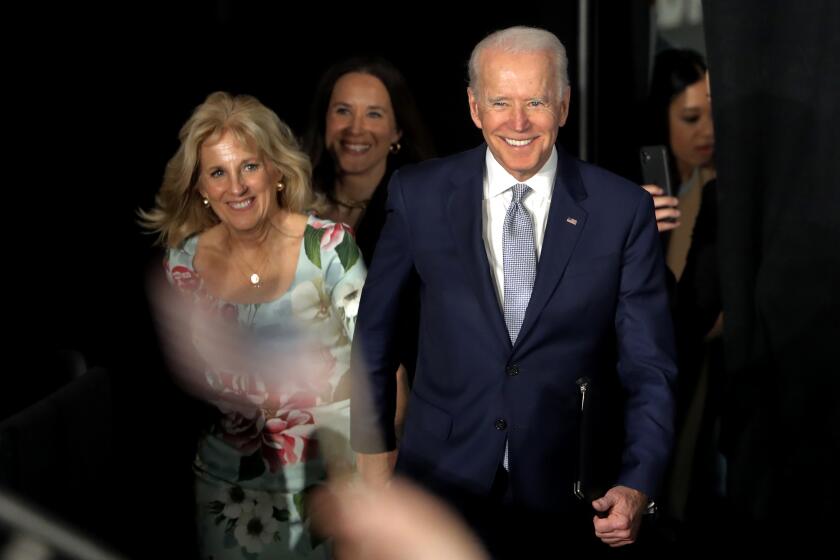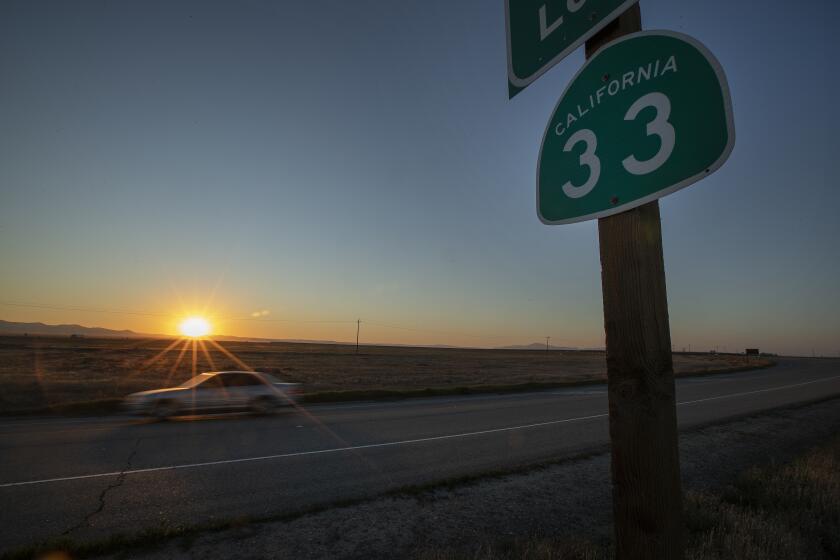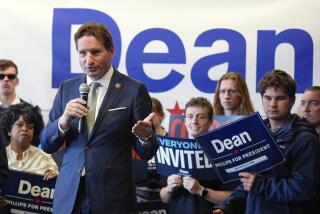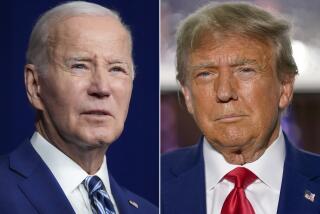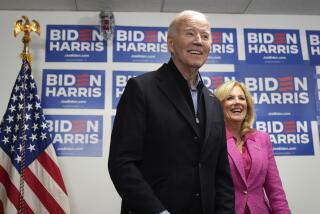With Buttigieg out, Biden portrays presidential race as two-man fight with Sanders
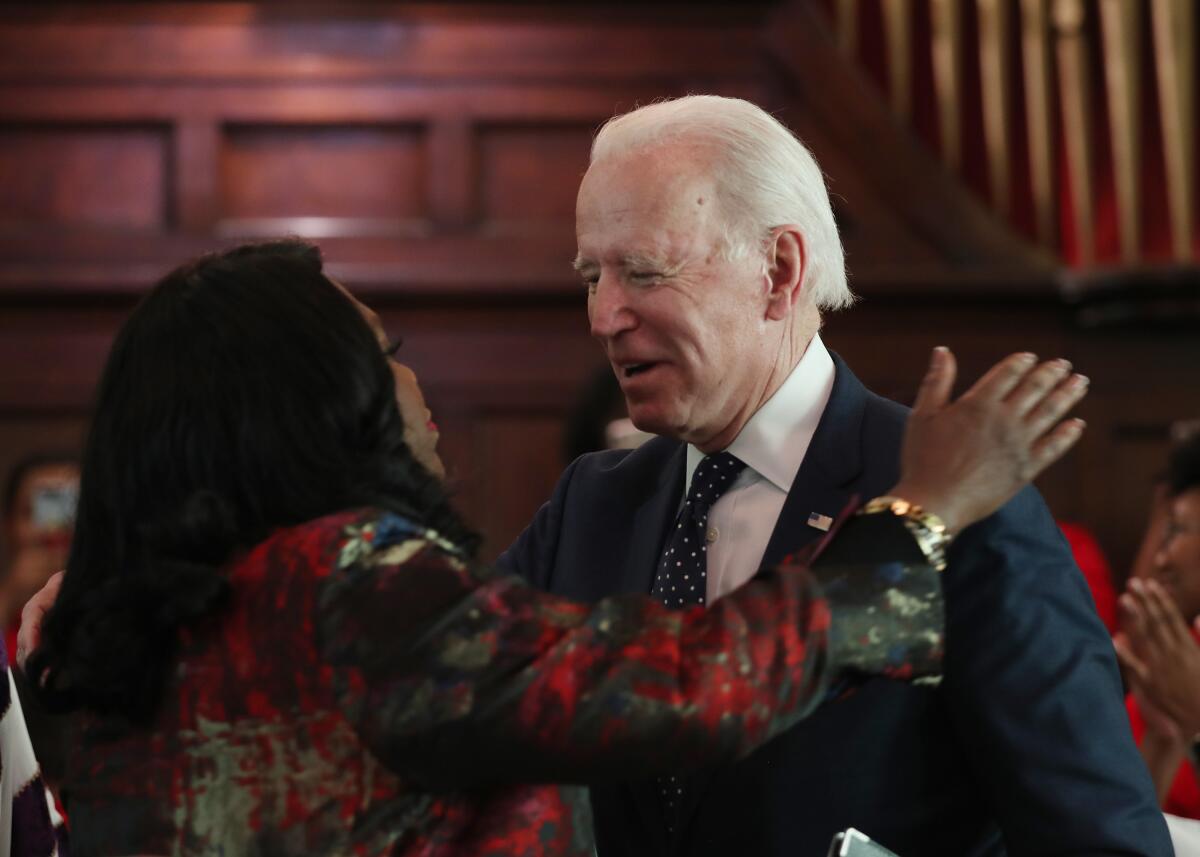
A resurgent Joe Biden worked Sunday to cast the Democratic presidential race as a two-man contest with Bernie Sanders, an effort that gained ground as Pete Buttigieg ended his candidacy and thinned the crowded competition for support from the center-left wing of the party.
Four weeks after the first ballots were cast, the contest was transformed virtually overnight as Biden won a crushing victory in South Carolina, and Buttigieg, the former mayor of South Bend, Ind., joined billionaire activist Tom Steyer in exiting the race. Both were competing against the former vice president for many of the same voters.
“Our goal has always been to help unify Americans to defeat Donald Trump and to win the era for our values,” an emotional Buttigieg told a hometown crowd Sunday night. “And so we must recognize that at this point in the race, the best way to keep faith with those goals and ideals is to step aside and help bring our party and our country together.”
The moves came as the campaign’s single biggest day of balloting, Super Tuesday, rapidly approached, with 15 contests on the calendar and former New York City Mayor Michael R. Bloomberg competing for the first time since he began sinking hundreds of millions of dollars into his candidacy.
Coming off his victory Saturday in South Carolina, Biden took a celebratory lap on the political talk show circuit, where he tried to elbow aside rivals by focusing the contest on himself and the more liberal senator from Vermont.
“I think Bernie Sanders’ position on a number of the issues, even in the Democratic Party, are going to be, are very controversial,” Biden said on NBC’s “Meet the Press,” suggesting Sanders would have to substantially raise taxes to pay for generous programs such as “Medicare for all” and student debt forgiveness.
“We’re getting down now, everybody’s going to look at Bernie’s record as closely as they’ve looked at mine over the last five months,” Biden continued, “and I think they’re going to see some stark differences in where we stand.”
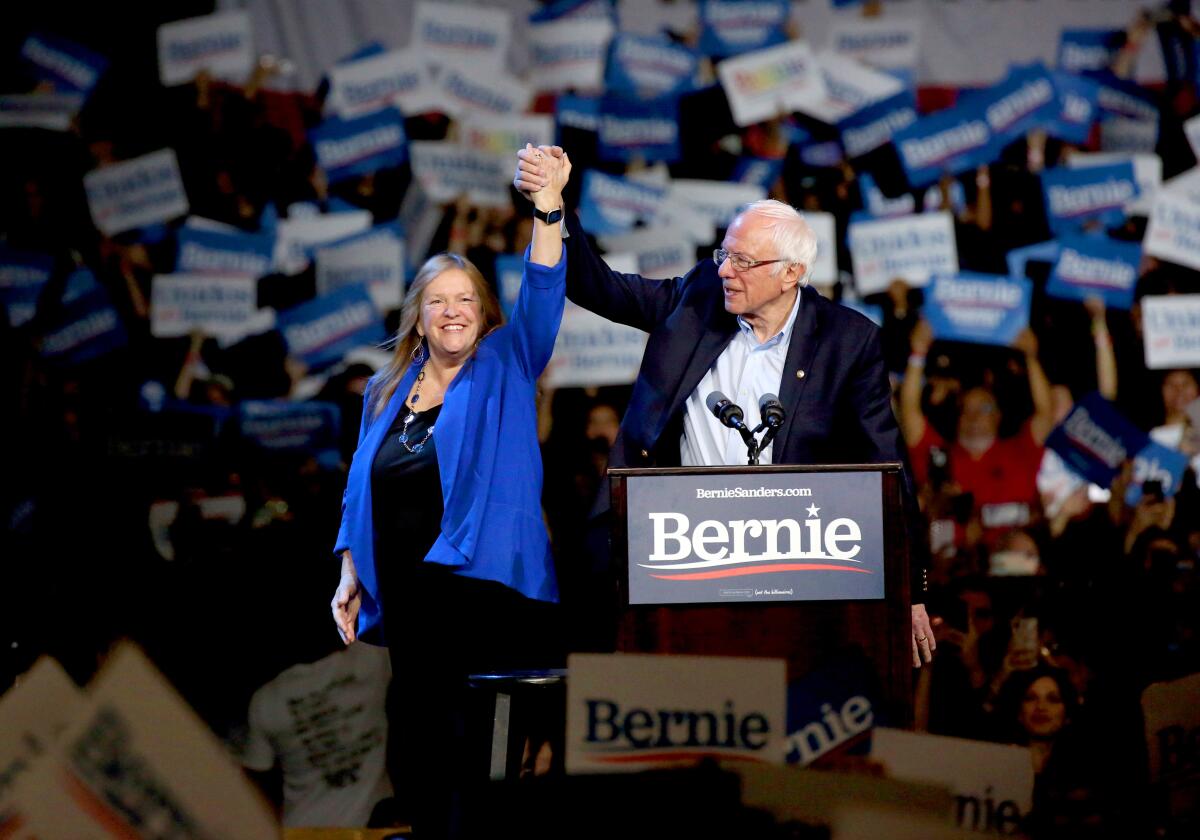
Sanders responded in kind, calling Biden a part of the political establishment that has long neglected those who struggle to get by day-to-day.
“In order to beat Trump, we are going to need the largest voter turnout in the history of this country,” Sanders said on ABC’s “This Week.” “And I don’t think you can do that unless you have a message that appeals to the working class and the middle class in this country.”
Later, at a massive downtown rally Sunday night at the Los Angeles Convention Center, Sanders urged supporters to bring their friends and family to the polls to ensure a big victory on Tuesday.
“The candidate who wins in California has an excellent chance to win the Democratic nomination,” Sanders said. “Let us have the highest voter turnout in California primary history. In this most consequential year, let us go forward and win the nomination. Let us go forward and defeat Donald Trump. Let us go forward and transform this country.”
Biden blows it out, Sanders underwhelms, Steyer falls flat, and Buttigieg continues to struggle for support among black voters.
Buttigieg’s departure caught most by surprise.
After a last round of campaign appearances, including a Sunday morning interview in which he said he would continue running, Buttigieg abruptly reversed course and flew home to announce his decision. He won the Iowa caucuses and finished a close second in New Hampshire, but stalled in Nevada and South Carolina, in good part because of a lack of support in the black and Latino communities.
That leaves Bloomberg as Biden’s main competitor for centrist voters.
The ex-mayor inserted himself into the political debate over the spreading coronavirus threat with a presidential-like address to the nation Sunday night that implicitly criticized President Trump and touted Bloomberg’s experience handling assorted crises during his years in City Hall. The billionaire was spending several million on the three-minute broadcast, adding to a campaign tab that has already topped more than $650 million.
There were signs of trouble, however, even before Bloomberg put his name before voters.
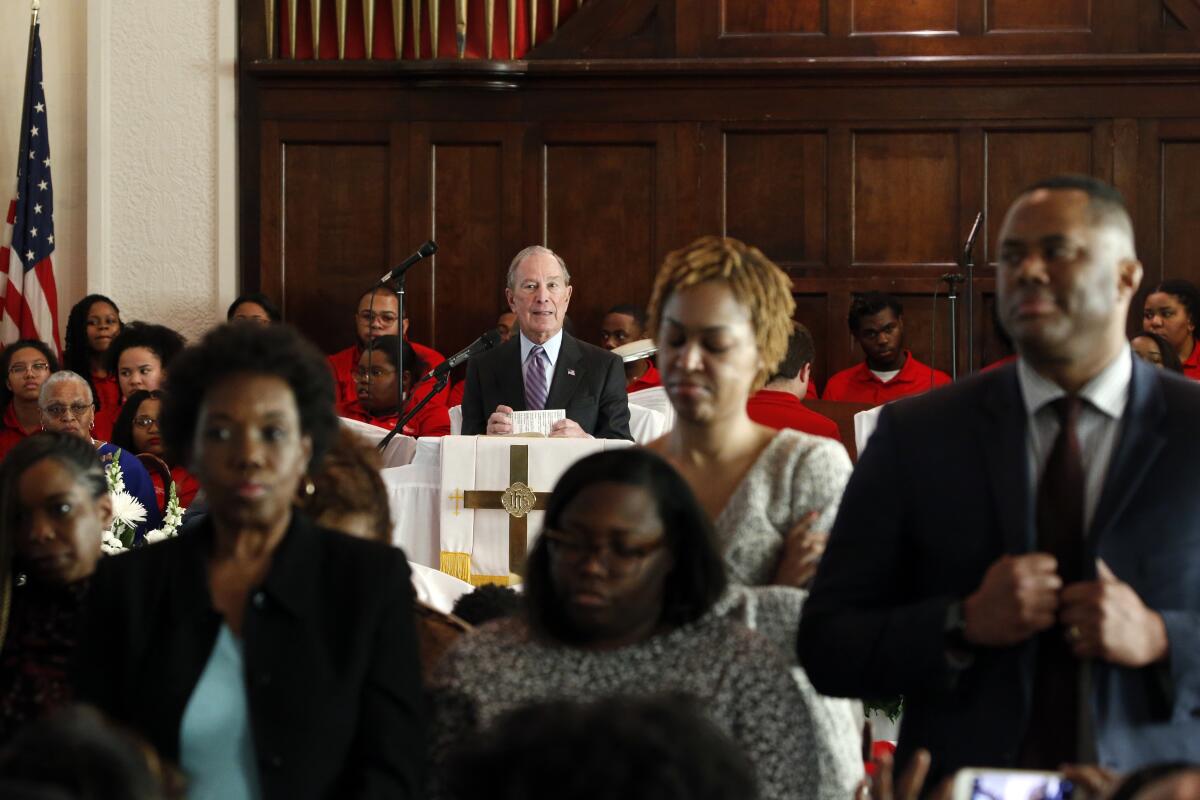
Nearly 7 in 10 South Carolinians had a negative view of the media mogul, according to exit poll interviews conducted Saturday by Edison Research. And on Sunday in Selma, Ala., a small group of churchgoers stood up and silently turned their backs as he spoke from the pulpit of the historic Brown Chapel AME Church.
Bloomberg, who has apologized for a controversial New York City police policy that targeted young black and brown men, showed no reaction as he stuck to remarks about racial inequality.
“In Alabama and across much of this country, there’s still millions of women and men who are being denied the right to vote simply because of the color of their skin,” Bloomberg said before reciting the names of foot soldiers in the civil rights movement who were beaten and bloodied in Selma 55 years ago.
By contrast, Biden was warmly received, given his own chair near the altar while Bloomberg sat in a pew. He was introduced by Alabama’s Democratic senator, Doug Jones, and Selma’s Rep. Terri A. Sewell.
“I’m honored to be here this morning with so many longtime friends,” Biden said, among them Rep. John Lewis (D-Ga.), a hero of the civil rights movement. “The first time I came to this chapel was with John Lewis, a guy who was literally prepared to give his life.”
Biden’s decisive win in South Carolina came as a relief to many more moderate Democrats who fear running with Sanders, an avowed democratic socialist, atop the presidential ticket in November. Seeking to buttress his candidacy and reemergence in the campaign’s top tier, Biden rolled out a number of endorsements Sunday, including the support of former Sens. Barbara Boxer of California and Blanche Lincoln of Arkansas.
He also boasted of collecting more than $10 million in contributions in just 48 hours, surpassing his fundraising total for the entire month of January.
Biden’s commanding victory Saturday was reassuring to some black voters who watched as the former vice president stumbled through early contests in Iowa and New Hampshire; he promised to regain his equilibrium in South Carolina, where African Americans made up more than half the primary electorate.
“Joe Biden did what he said he was going to do,” said Cookie Green, a home-care provider from Repton, Ala., as she left a morning prayer breakfast ahead of a day of commemoration ceremonies in Selma. “I am pulling for him 110% and hoping he goes to the White House. I don’t want no politician on training wheels.”
Alabama and Arkansas are two of 14 states, including California, that will vote on Tuesday, along with American Samoa. By the time polls close, roughly 40% of the delegates needed to win the Democratic nomination will have been allocated, though it may be some time before the exact apportionment is known.
Candidates winning as little as 15% support can walk away with delegates. With so many targets of opportunity, and the prospect of leveraging those delegates in the event of a contested convention, no one else was willing to follow the lead of Buttigieg and Steyer, who quit Saturday night after a distant third-place finish behind Biden and Sanders in South Carolina.
Up and down State Route 33, which runs from Ventura to Stockton, rural Californians fear for the future.
Massachusetts Sen. Elizabeth Warren suggested she might fight on to the Democrats’ nominating convention in July. Her campaign manager, Roger Lau, said in a post on Medium that he expected the field to narrow drastically after Super Tuesday and for Warren to remain one of the few viable candidates heading into a convention with no clear winner.
“Our grassroots campaign is built to compete in every state and territory and ultimately prevail at the national convention in Milwaukee,” Lau wrote.
Massachusetts is another of the Super Tuesday states, and polls suggest Warren is in a close fight there against Sanders. Also voting Tuesday is Minnesota, the home state of Sen. Amy Klobuchar, who, like Buttigieg and Warren, finished far out of contention in South Carolina.
On Sunday, Klobuchar posted a tweet citing 13 newspapers “from coast to coast and north to south” that had endorsed her campaign, which appears to have lost all traction after a surprising third-place finish in the Feb. 11 New Hampshire primary.
She joined several other candidates as they marched Sunday afternoon with hundreds of others across the Edmund Pettus Bridge in Selma, where the brutal police beating of peaceful demonstrators in 1965 sparked worldwide outrage and helped fuel the civil rights movement.
Barabak reported from Los Angeles and Jarvie from Selma, Ala. Staff writer Seema Mehta contributed to this report.
More to Read
Get the L.A. Times Politics newsletter
Deeply reported insights into legislation, politics and policy from Sacramento, Washington and beyond. In your inbox three times per week.
You may occasionally receive promotional content from the Los Angeles Times.
